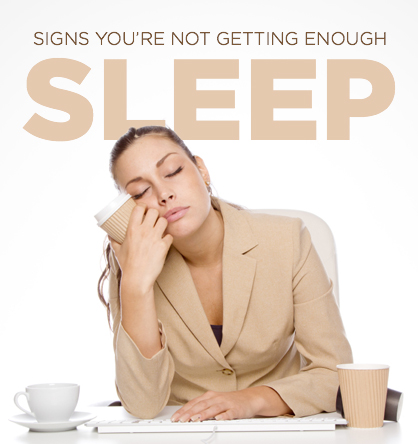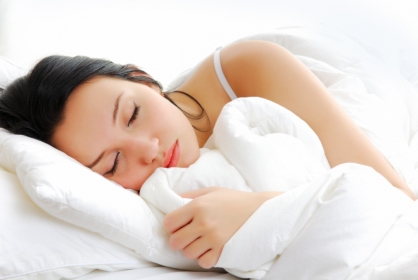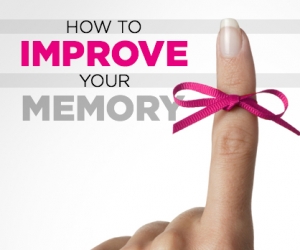Are You Getting Enough Sleep?
Signs of sleep deprivation and what to do
If you're not getting enough sleep, you can feel grump and foggy. Those are the obvious symptoms that everyone is aware of. But there are other negative effects to your sex life, memory, health, looks and even weight loss. Not to mention the stress factor.
Here's how to tell if you're not getting enough sleep and what to do about it.


A key component of health
Getting enough sleep is a key aspect to keeping your body and mind healthy, said Dr. Jill Waibel, M.D., medical director and owner of Miami Dermatology and Laser Institute in Miami, Fla.
“Not only can lack of sleep leave you feeling groggy and tired, but it also can affect your physical appearance. One of the most prominent signs of sleep deprivation is visible circles under the eye. This happens because lack of sleep causes blood vessels under the skin to dilate, creating a visible dark tint to the skin. Another sign is a dull look to the skin. When you sleep, you turn over new cells in the body, keeping the skin looking fresh and rejuvenated. It is very common to cut beauty corners when operating on little sleep so trying to maintain a beauty regime even when you're not feeling your best can keep the skin from looking dull. Rubbing the eyes is common attempt to relieve the heaviness one may feel from by lack of sleep, which further contributes to a change in outward appearance,” Dr. Waibel said.
Two of the lesser known effects of sleep deprivation are stress and an inability to lose weight, said Dr. Gabriella Farkas M.D., Ph.D., who is training to be a psychiatrist at Long Island Jewish Medical Center and Zucker Hillside Hospital in New York.
“According to the Stress in America survey in 2013, adults who sleep fewer than eight hours a night are more likely to report symptoms of stress in the past month, such as feeling irritable or angry, than adults who sleep more than eight hours a night (45% vs. 32% of adults); feeling overwhelmed (40% vs. 27%). They are also more likely to say their stress has increased in the past year (40% vs. 25%). During deep sleep, sympathetic nervous system activity is decreased and parasympathetic nervous system activity is increased encouraging the body’s restorative functions. Sleep loss is associated with sympathetic activation and higher stress hormone (eg cortisol) levels, which are part of the stress reaction fight or flight cascade in the body. The cascade includes quickening of heart and respiratory rate, centralization of the blood circulation (to shift blood to vital organs), elevating blood pressure (causing hypertension if chronic), raising blood sugar levels (causing diabetes if chronic) and decreasing blood flow to other organs, for instance the GI track, causing ‘butterflies in the stomach’, lack of appetite and gastric ulcer, if chronic, just to name a few example of the numerous negative health effects,” Dr. Farkas said.
The second lesser known effect is the inability to lose weight. “Your sleep cycle affects the production of ghrelin and leptin, two hormones important in fat burning. Sleeping 5 hours or less per night had a 15% greater amount of ghrelin and 15% less leptin as opposed to those sleeping 8 hours impairing the body's ability to burn fat; if chronic, this imbalance can actually shut down the body's ability to burn fat at all; leaving the individual unsuccessful, suffering from further health risks of obesity even after multiple rounds of diets,” Dr. Farkas said.

What to do
Dr. Farkas shared her tips on how to prevent sleep deprivation:
- Listen to your body - simply go to sleep when you're sleepy
- Avoid frustration - don't spend too much time in bed awake. If you have hard time falling asleep, get up, do something calming or boring for 20 minutes - then try to go to sleep again
- Avoid clock watching - frequent time checking reinforces negative thoughts like “OMG I'm not getting enough sleep!”
- Get regular – try to stick to going to bed every night around the same time.
- Dim the light – a good way to let your body know that it is time to rest.
- The right place – you want your bed in a cozy and calm corner of the room.
- Avoid overstimulation I – no computer use or movies right before going to bed.
- Avoid overstimulation II – no caffeine or stimulants before bedtime.
- Avoid overstimulation III – refuse to worry about things before going to bed. Decide to worry about them the next day at a set time.
- Avoid overstimulation IV - don't be a slave to your phone - have a rhythm using your phone. Your brain and phone both need a break. Set up a firm time (eg 8 pm) you stop reaching for your phone every day and stick to it.
- Avoid overstimulation V - vigorous exercise will prevent you from being able to slow down.
- Guard your sleep cycle - no alcohol or cocoa before bedtime; it breaks down your sleep cycle causing you to feel tired and irritable the next day.
- Bed is for sleeping - avoid using too much other activities in bed. Train your brain that bedtime = sleeptime.
- Help your body relax - taking a hot bath, getting a massage, listening to soothing music, having good sex are all wonderful strategies.
- Certain food high in tryptophan and serotonin help make you sleepy – cheese, hot milk or any other diary product, banana.
- No naps - try to avoid excessive napping although if you're really tired, taking a 20 minute nap can actually increase your productivity in the second half of the in the day
- Manage your people - if someone is soothing to you, it is a good idea to wrap up the day chatting. However, if it is someone who you frequently get into arguments with, try to limit interacting as you get close to bedtime
- Consider using a sleep diary - track your sleep for 2 weeks to see what patterns you are following
- Eat right in the right time - being hungry or overeating right before bedtime will prevent you from having a good sleep
Maintaining a healthy diet is also key, said Dr. Waibel.
“A healthy diet will help you feel energized more naturally. Dehydration is a main cause for bags under the skin, so making sure you're getting the suggested amount of daily water intake is extremely important. Some creams and topicals can be used to relieve the visible signs of sleep deprivation in the face. Retin-A is a topical that can be applied to the skin to reduce the appearance of wrinkles and discoloration. Of course, it is important to understand the right amount of sleep you need to perform at your best level and to feel refreshed and rejuvenated. Not getting enough sleep affects you mentally, emotionally and physically, so maintaining a steady sleep routine can be the key to feeling and looking your best.”
Tagged in: sleep quality, sleep habits, sleep deprivation,



